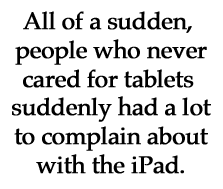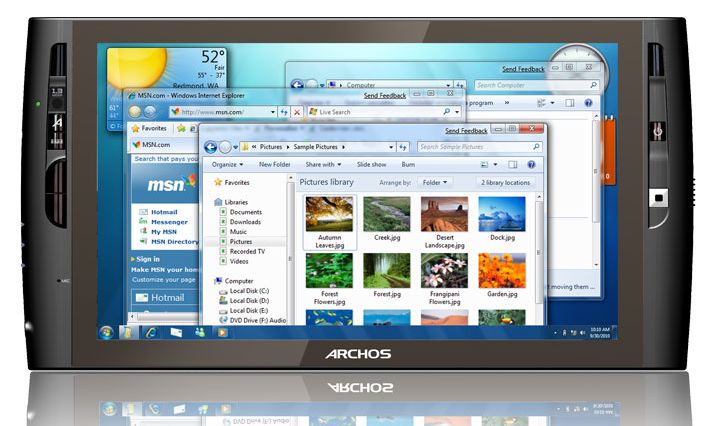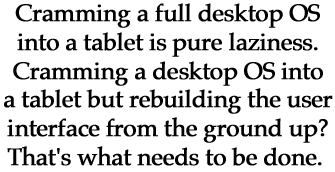5 Reasons Tablets Suck And You Won't Buy One
Let's admit it: tablets suck. They've been around for at least a decade. Many are faster and offer more capabilities than Apple's upcoming iPad, from speed to storage, connectivity, and "full operating systems." So, why haven't you bought one yet?
Back in 2002, research and analyst firm Gartner had this to say: "Tablet PCs will have a natural fit in many vertical applications that currently use pen-based tablets," said Ken Dulaney, vice president and research area director for Gartner. "However, a lack of application support, clumsy hardware designs, and a price premium will be barriers for most users."
That's still true even today. Tablet manufacturers are doing things all wrong.
Poor usability has always been an issue since the dawn of tablets. Consumer interest was only recently resurrected when rumors began about Apple releasing a tablet device, which ended up becoming true. Most gruesomely, the iPad received not only praise--mainly by Apple loyalists--but also a ton of flack from PC users.
Then again, it's not a perfect device in its own class and some Apple fans criticized it, too.
But hold the horses. The industry went from "who gives a hoot" about tablets to "wow, the iPad sucks" in a mere two months?
All of a sudden, people who never cared for tablets and slates suddenly had a lot to complain about with the iPad, as though they were really waiting for Apple to release the end-all, be-all tablet device and then were let down by Jobs and Co. Would all the naysaysers have bought an iPad if it were made like competing tablets and came with a full copy of OS X? No, because they didn't buy the other "full-featured" tablets that were already on sale.
Just visit your favorite computer store or online retailer to see that the evidence for tablet popularity is blatant: there is no popularity. Here's why:
Get Tom's Hardware's best news and in-depth reviews, straight to your inbox.
1. Tablets Are Niche Devices
Tablets aren't a new concept. They've been around for a long time. But they haven't really caught on, simply because they're unable to do everything you can do on a laptop--and even a netbook--in a more convenient way. They've shipped with stylus-pointing devices that were frankly not that easy to use, despite the whole pen and paper concept.
2. Full OSes Were Always There, Yet Those Who Complained That The iPad Doesn't Have One Still Never Bought One
Ever since tablets were usable, they've had full operating systems, primarily Windows. Microsoft at one point was pushing the whole tablet concept hard and it failed. Why? Because full desktop/laptop operating systems don't work on a tablet device. They're not designed from the ground up to be usable with your finger--and even a stylus. All user-interface mechanics on a full-blown OS are designed to work with a mouse, not your finger/stylus.
This is why phones have interfaces designed specifically for usage on their screen sizes and device sizes. Can you imagine pecking around with your finger on ultra-thin scroll bars and tiny buttons? Cramming a full desktop OS into a tablet is pure laziness. Cramming a desktop OS into a tablet but rebuilding the user interface from the ground up? That's what needs to be done. Microsoft needs to accomplish this.
3. High-End Hardware Specs Sometimes Don't Matter
People complained about the iPad being underpowered compared to other tablets that came before it. So what? All those tablets failed, never caught on, and ended up being forgotten. Name one successful tablet from any company. Take Archos tablets, for example, that was filled with features and had a full Windows OS. Very few people have one, let alone know of or even care about the device.
In 2001, Bill Gates said this: "Within five years, I predict it will be the most popular form of PC sold in America."
Five years later, IDC said this: "Tablet PCs accounted for just 1.5% of notebook PCs sold worldwide last year." That's not 1.5% of all PCs sold, that's 1.5% of notebook PCs. Even Bill Gates was wrong.
By the end of 2008, when tablets already surpassed what the iPad is today in terms of hardware, Archos shipped less than 15,000 units of its Wi-Fi+3G tablet worldwide, which is telling. I personally know some people who bought one, only to never touch it again after two to three months of use because they "grew out of it."
The point isn't to cram as much technology into a tablet as physically possible. It's far better to make the tablet really intuitive to use in a way that makes sense for that kind of form factor. Something both Microsoft and the majority of tablet makers out there fail to do. Yes, many tablets claim to offer the full "desktop experience" on a tablet, but that works in a counterintuitive way. If I wanted the desktop experience, I would use a desktop.
Tablet makers: please, don't try to pump insane hardware specs into your tablets and bloat up prices. Design what makes sense for that form factor with a clear form-to-function goal in mind.
4. Interface, Interface, Interface
Using a stylus to navigate around a full-blown OS is hell if you've ever had any long-term experience using a tablet and stylus combo. When you navigate around the user interface, you have to use the stylus. Then when you need to type, you have to put the stylus down and use your fingers or peck at the virtual keys with the thing. Prior to multi-touch, the stylus was one of the number-one contributing factors why people eventually forgot about tablets.
People have 10 fingers, so design an interface that uses what we have already. This is the number-one reason why the iPhone took off in such a big way. Despite some popular belief, it isn't the Apple loyalty or marketing machine that made the iPhone what it is today. It's the fact that the iPhone OS and the excellent finger interface were designed well and people caught on to it. The iPhone's popularity was significantly driven by its ease of use and would still be popular today with or without Apple's marketing machine. This is why mobile phone OSes these days all have similar interfaces. Even Microsoft had to eventually ditch its Windows Mobile and stylus-pecking interface for phones--yet it still continues to be lazy on the tablet front.
5. Lack Of Tablet Apps
The fact that most tablets run on Windows or another non-tablet friendly OS means that pretty much most applications are not going to be tablet and finger friendly. They're all the same desktop apps that require a mouse and keyboard to be fully usable. This is where things get really difficult to solve and Apple has a huge arsenal in the form of the App store. The only thing that can help give Apple competition is if Microsoft steps up its game and develops an app ecosystem with tons of apps that are designed from the ground up to be used by normal citizens.
To catch on, Microsoft needs to grab the mindshare of not savvy computer users, but mainstream users--all the people you and I know and for whom we have to fix computer problems. Then the more technical apps will follow. Microsoft needs to capture the larger piece of the pie first to generate attraction, which is something it has failed to do with Windows for its tablet PC.
Take clues from what Apple has done with its office productivity suite: Apple literally had to redesign and retool iWork from scratch with a brand-new user interface designed specifically for easy tablet use. Buying a regular tablet and installing Microsoft Office 2007 on it will have you switching back to your notebook or desktop in no time. It's counter intuitive and simply not "fun" to use.
HP demonstrated its Slate earlier this year to a crowd at CES. On the form-factor and spec front, it was great. At its heart though, was a full copy of Windows 7 with a virtual keyboard. I'll be the first to say it but the iSlate is going to be a flop and it's not going to be all HP's fault.
Microsoft, HP, Archos, and other tier-one manufacturers need to band together and come up with an interface for Windows that makes sense for tablets. And since Microsoft is the OS supplier, it needs to get its act together and make this happen. Otherwise, it'll be 2001 all over again, except Apple will be the king of tablets--and no one wants a monopoly.
If you're interested, check out this interview with Bill Gates with InformationWeek about the "Tablet PC" and see how vision means nothing without proper design, execution, and cohesiveness.
-
wolfseeker2828 I agree, I found it funny that people were complaining about an iPad when most of them had never even HEARD of a tablet before it, much less ever considered using one. The only thing it's good for is if you're a 3D graphics/modeling guy.Reply -
I still think iPad will be a success and that the future for everyday tasks is touchscreen. You won't buy a tablet to replace a PC. You buy a tablet instead of buying a 2nd PC because most of the time you do things that don't require a powerful graphic card and complicated OS. I find the iPad perfect to replace my wife's laptop because she doesn't do games. At least not 3D ones. I will keep my gaming desktop... and this is how everyone's happy, including me when I'll come from work, want to pick my email or browse the net and I'll just fetch the iPad.Reply
-
coopchennick I've never really seen a need for one. A guy in my class had one and he could write on it and turn it into a word document. That was the biggest up side I'd seen to date.Reply -
wait until you see this http://eeepc.net/broadcoms-tablet-plans-are-high-and-mighty/ in the market. It fulfills all the weaknesses the current tablets have.Reply
-
Capm I agree, it is all the apps and interface. It could be the way for me to eliminate paper altogether, but it has to be usable. As a cable tech, I have to carry around alot of paperwork for me to fill out and people to sign, and I have to take it all back to the office and file it, it would be nice to just get a customers signature or thumbprint on the tablet, and just sync with the office network and deposit my forms on a server that the csr's can then deal with. But if its clumsy and difficult to use, then it makes it less efficient than paper.Reply -
dickcruz that is true, now there's that one device that's a pen and it can record hand motions so when you write stuff it can later transcribe it into text and convert it into a word document or audio, that's pretty niftyReply -
Nutjob Why I wouldnt get a tablet. I use my computer to surf the net, watch hd content (28 inch monitor), gaming and in my spare time I sometimes upload videos to youtube so I also do some video converting.Reply
-
victomofreality I see tablets as a stage in the evolution of portable computing. Though unless I have money to burn I think I'll stay out of this incarnation and wait for the next hopefully they'll have figured out how to raise the portability and protect the screen.Reply


